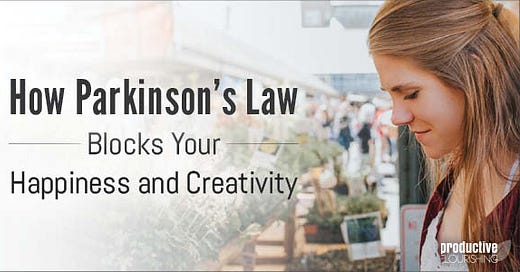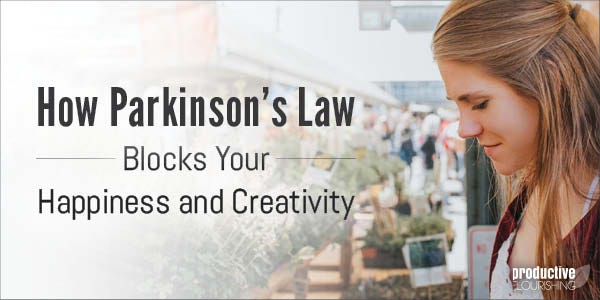How Parkinson's Law Blocks Your Happiness and Creativity
Why would you want to spend less time doing something you enjoy doing?
Imagine that your favorite band is coming into town in a few months. You rush to buy your tickets, and the months slowly wind down until the day of the concert.
You head to the arena and patiently sit through the opener until your band finally comes out.
They rock the house for about an hour, the lights raise, and the lead singer triumphantly lets you know that they're only doing six songs tonight because they're more productive that way. They can do more shows in more locations if they cut their set list down to an hour.
Thanks! Hope you enjoyed the show!
Not only would you feel cheated, but you’d also intuit that something was off with the way they understood ‘productivity’.
Parkinson's and Productivity
Parkinson's Law is a theory of productivity made wildly popular by Tim Ferris in The 4-Hour Workweek. I'll use his expression of the "Law" since I invoked his usage:
Parkinson's Law dictates that a task will swell in (perceived) importance and complexity in relation to the time allotted for completion.
Tim’s suggestion regarding Parkinson’s law is "shorten work time to limit tasks to the important."
When I read the 4-Hour Workweek (4HWW) for the first time, his discussion of the 80/20 rule and Parkinson's Law really resonated with me. And, in some senses, it helped me focus on cutting out wasted time and did, in fact, make me a bit more productive.
I now see things a lot differently, though, when it comes to ‘work’.
Meaningful Play — Old Concept, New Name
I've talked about meaningful play in the past, but I called it "productive play" in previous posts. Ironically, I've received a lot of pushback about using the term "productive" 'in this way from two directions; people who don't like the word "productive" didn't like it being attached to play, and productivity fanatics didn't like the word "productive" being applied to goals across the board. Were it just for the fact that people didn't like the term, I probably would have stood my ground, but the truth of it is that "meaningful play" captures the concept better and fits into some other things I'm working on.
Meaningful play is just that state in which you're doing really meaningful and valuable stuff, but your orientation to it is not the same as your orientation to work precisely because it's much more enjoyable. The Flow that comes from meaningful play is just as powerful as the Flow that comes from stress, but it's a more sustainable type of Flow.
Given my understanding of meaningful play, you can see why I think one of the major problems with the 4HWW is Tim’s presentation of work. For him, work is solely the stuff you don’t want to do. Sure, we all want to avoid doing stuff we don’t want to do, but that's almost tautological. Many of us aren't trying to do less work as much as we're trying to do more meaningful play.
That said, to do some meaningful play, you often have to do some things you'd rather not do. For instance, I’m not a big fan of inputting appointments in my calendar — but that’s a discrete component of the process of connecting with clients and friends. At the same time, connecting with clients and friends is part of the meaningful play I do, and the day I want to cut calls short because I don’t want to do them is the day that I’ll start figuring out how to stop coaching.
If you’re doing the thing that makes you come alive, why would you want to limit the time you’re doing it? If you understand that the end of creating art is to create art and you’re doing it because you love doing it, then the goal is to spend more time in the process, not less. You wouldn’t want your favorite band to cut their concert by two-thirds, so why would you cut your own concert?
Time Crunching and Unhappiness
For ease of convenience, let's call Tim's suggestion "time crunching." What time crunching does is use time to constrain and channel focus. However, using time crunching as a standard way to work has two negative and inter-related byproducts: 1) it reinforces the association of work with anxiety and negativity and 2) it short-circuits the creative process.
Meaningful play comes with a certain kind of stress on its own and Tim’s discussion of eustress gets that right. Eustress is the positive stress that is part of the process of growth, change, and risk, and in that sense, eustress is a good guide for determining whether you’re doing something that’s making you come alive.
However, adding anxiety to your work by trying to crunch the time available for your meaningful play is adding a qualitatively different type of stress to your work. What’s particularly problematic is that it’s easy to slip from eustress as a byproduct of meaningful play to distress as a result of anxiety and time compression.
Time Crunching and Stifled Muses
Which leads to the second way in which time crunching as standard practice is problematic: there is a relationship between decreased creativity and anxiety.
At a certain level of distress, the creative process is stalled because you’re preoccupied by stressors.
For example, financial worries can become so powerful that your thoughts and feelings are devoted to managing the stress, which ironically can keep you from thinking about the ways you might work through those financial worries. As a result, your preoccupation with the stress allows the stressor to perpetuate or worsen, so your preoccupation with the stress remains or increases, so the stressor perpetuates or worsens, and the cycle continues until a new condition, behavior, or thinking pattern manifests.
All the while, your creativity is tied up in managing stress rather than generating solutions. While this may seem hyperbolic, consider your thought processes as you approached a stiff deadline — I’ll bet a good deal of your psychic energy was spent on thinking about the deadline and what would happen if you missed it rather than on the work itself.
In other circumstances, distress and time crunching short-circuits the Incubation phase of the creative process. Since you have come up with an idea in a short amount of time, those rich ideas that require some additional percolation stay on the back burner in favor of those simpler and more actionable ideas that can be generated in a short amount of time. However, if every creative block is spent on quick-fire ideas, eventually the rich ideas lose their steam. The result here is that you end up with a bunch of easy ideas, none of which qualitatively compare to the impact the richer ideas might have or, frankly, to the caliber of your intelligence and talent.
Big ideas can be scary. They rarely present themselves quickly or in ways in which it’s immediately obvious that they should be what you’re working on. It’s hard enough to work through creative doubt and expansiveness, but when you add the additional constraints posed by time crunching, the real risk is letting go of the big ideas in favor of low-hanging fruit. Instead of picking fruit, grow trees.
Time as a Container, Not a Constrictor
The odd thing about Parkinson’s Law is that the observation is accurate but the reasoning behind it is either flawed or based on unnecessary assumptions about the nature of work. Work expands to fill the time available for it because we don’t allocate dedicated time to focus on one thing at a time. Without that time allocation, the work continually slides into the future, undone. Note the difference between time blocking and time crunching — time blocking is about dedicating time to tasks with specific outcomes, whereas time crunching is about compressing time. Time blocking is incredibly effective and sustainable.
The irony here is that whether we’re directly or indirectly working on something, we’re still working on it. That work going on in the background impacts our ability to commit our full attention on the one task at hand.
Focus is a funny thing. If you try to force yourself to focus, you can’t. If you don’t give yourself time to focus, you won’t. Try to do too many things at any given time and you can’t focus on any one of them. And if you don’t give yourself enough time to immerse yourself in a creative task, you’ll resist focusing on it in the first place.
Time is not a tool to squeeze extra creativity and productivity out of your head — it’s the container that holds the work we do. Some work requires larger containers than others. Sometimes we need to see that the container is temporary so that we complete the work in the time we have available.
What Tim downplayed was the fact that while he was transitioning between kickboxing, tango dancing, and dragon-slaying, he had time to come up with big ideas. He took time to develop the ideas and write the very book that, on the face of it, advocates spending less time doing the things that make some of us come alive. To his credit, he presented things the way he did because he knew it would resonate with a lot of people and increase the sales of his book, and I'm quite sure that he knows all about meaningful play.
You might not like the work you do and you may want to do less of that — I just encourage you to think more carefully about how much of your time, attention, and energy you want to spend avoiding doing things instead of figuring out the right things to do. Instead of trying to crunch time available for “work” so that you speed it up, focus on spending more time doing the stuff that helps you come alive and minimize or eliminate the rest. Perhaps more fundamentally, though, recognize that meaningful work will always have components that aren’t as attractive as other components, but working through those less-attractive components is the cost of enjoying the meaningful ones.
You have to do some squeezing to get some juice, but just because you'll have to do some squeezing doesn't mean you should miss out on the juice.





